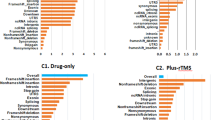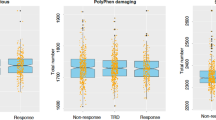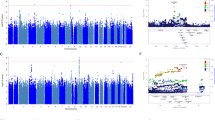Abstract
It would be beneficial to find genetic predictors of antidepressant response to help personalise treatment of major depressive disorder (MDD). Rare copy number variants (CNVs) have been implicated in several psychiatric disorders, including MDD, but their role in antidepressant response has yet to be investigated. CNV data were available for 1565 individuals with MDD from the NEWMEDS (Novel Methods leading to New Medications in Depression and Schizophrenia) consortium with prospective data on treatment outcome with either a serotonergic or noradrenergic antidepressant. No association was seen between the presence of CNV (rare or common), the overall number of CNVs or genomic CNV ‘burden’ and antidepressant response. Specific CNVs were nominally associated with antidepressant response, including 15q13.3 duplications and exonic NRXN1 deletions. These were associated with poor response to antidepressants. Overall burden of CNVs is unlikely to contribute to personalising antidepressant treatment. Specific CNVs associated with antidepressant treatment require replication and further study to confirm their role in the therapeutic action of antidepressant.
This is a preview of subscription content, access via your institution
Access options
Subscribe to this journal
Receive 6 print issues and online access
$259.00 per year
only $43.17 per issue
Buy this article
- Purchase on Springer Link
- Instant access to full article PDF
Prices may be subject to local taxes which are calculated during checkout
Similar content being viewed by others
References
Tansey KE, Guipponi M, Perroud N, Bondolfi G, Domenici E, Evans D et al. Genetic predictors of response to serotonergic and noradrenergic antidepressants in major depressive disorder: a genome-wide analysis of individual-level data and a meta-analysis. PLoS Med 2012; 9: e1001326.
Uher R, Perroud N, Ng MY, Hauser J, Henigsberg N, Maier W et al. Genome-wide pharmacogenetics of antidepressant response in the GENDEP project. Am J Psychiatry 2010; 167: 555–564.
Garriock HA, Kraft JB, Shyn SI, Peters EJ, Yokoyama JS, Jenkins GD et al. A genomewide association study of citalopram response in major depressive disorder. Biol Psychiatry 2010; 67: 133–138.
Ising M, Lucae S, Binder EB, Bettecken T, Uhr M, Ripke S et al. A genomewide association study points to multiple loci that predict antidepressant drug treatment outcome in depression. Arch Gen Psychiatry 2009; 66: 966–975.
Investigators G, Investigators M, Investigators SD . Common genetic variation and antidepressant efficacy in major depressive disorder: a meta-analysis of three genome-wide pharmacogenetic studies. Am J Psychiatry 2013; 170: 207–217.
Tansey KE, Guipponi M, Hu X, Domenici E, Lewis G, Malafosse A et al. Contribution of common genetic variants to antidepressant response. Biol Psychiatry 2013; 73: 679–682.
Cook EH Jr., Scherer SW . Copy-number variations associated with neuropsychiatric conditions. Nature 2008; 455: 919–923.
Stefansson H, Rujescu D, Cichon S, Pietilainen OP, Ingason A, Steinberg S et al. Large recurrent microdeletions associated with schizophrenia. Nature 2008; 455: 232–236.
Purcell SM, Wray NR, Stone JL, Visscher PM, O'Donovan MC, Sullivan PF et al. Common polygenic variation contributes to risk of schizophrenia and bipolar disorder. Nature 2009; 460: 748–752.
Sebat J, Lakshmi B, Malhotra D, Troge J, Lese-Martin C, Walsh T et al. Strong association of de novo copy number mutations with autism. Science 2007; 316: 445–449.
Glessner JT, Wang K, Cai G, Korvatska O, Kim CE, Wood S et al. Autism genome-wide copy number variation reveals ubiquitin and neuronal genes. Nature 2009; 459: 569–573.
Williams NM, Zaharieva I, Martin A, Langley K, Mantripragada K, Fossdal R et al. Rare chromosomal deletions and duplications in attention-deficit hyperactivity disorder: a genome-wide analysis. Lancet 2010; 376: 1401–1408.
Rucker JJ, Breen G, Pinto D, Pedroso I, Lewis CM, Cohen-Woods S et al. Genome-wide association analysis of copy number variation in recurrent depressive disorder. Mol Psychiatry 2013; 18: 183–189.
Thomas L, Mulligan J, Mason V, Tallon D, Wiles N, Cowen P et al. GENetic and clinical predictors of treatment response in depression: the GenPod randomised trial protocol. Trials 2008; 9: 29.
Perroud N, Bondolfi G, Uher R, Gex-Fabry M, Aubry JM, Bertschy G et al. Clinical and genetic correlates of suicidal ideation during antidepressant treatment in a depressed outpatient sample. Pharmacogenomics 2011; 12: 365–377.
Wang K, Li M, Hadley D, Liu R, Glessner J, Grant SF et al. PennCNV: an integrated hidden Markov model designed for high-resolution copy number variation detection in whole-genome SNP genotyping data. Genome Res 2007; 17: 1665–1674.
Colella S, Yau C, Taylor JM, Mirza G, Butler H, Clouston P et al. QuantiSNP: an Objective Bayes Hidden-Markov Model to detect and accurately map copy number variation using SNP genotyping data. Nucleic Acids Res 2007; 35: 2013–2025.
Pinto D, Darvishi K, Shi X, Rajan D, Rigler D, Fitzgerald T et al. Comprehensive assessment of array-based platforms and calling algorithms for detection of copy number variants. Nat Biotechnol 2011; 29: 512–520.
Uher R, Maier W, Hauser J, Marusic A, Schmael C, Mors O et al. Differential efficacy of escitalopram and nortriptyline on dimensional measures of depression. Br J Psychiatry 2009; 194: 252–259.
Purcell S, Neale B, Todd-Brown K, Thomas L, Ferreira MA, Bender D et al. PLINK: a tool set for whole-genome association and population-based linkage analyses. Am J Hum Genet 2007; 81: 559–575.
StataCorp 2007, Stata Statistical Software: Release 10.
Kirov G, Pocklington AJ, Holmans P, Ivanov D, Ikeda M, Ruderfer D et al. De novo CNV analysis implicates specific abnormalities of postsynaptic signalling complexes in the pathogenesis of schizophrenia. Mol Psychiatry 2012; 17: 142–153.
Uher R, Tansey KE, Malki K, Perlis RH . Biomarkers predicting treatment outcome in depression: what is clinically significant? Pharmacogenomics 2012; 13: 233–240.
Cohen J . Statistical Power Analysis for the Behavioral Sciences. Lawrence Erlbaum: Hillsdale, NJ, USA, 1988.
Team RDC. R: A Language and Environment for Statistical Computing. R Foundation for Statistical Computing 2011. http://www.r-project.org/.
Sanders SJ, Ercan-Sencicek AG, Hus V, Luo R, Murtha MT, Moreno-De-Luca D et al. Multiple recurrent de novo CNVs, including duplications of the 7q11.23 Williams syndrome region, are strongly associated with autism. Neuron 2011; 70: 863–885.
Pinto D, Pagnamenta AT, Klei L, Anney R, Merico D, Regan R et al. Functional impact of global rare copy number variation in autism spectrum disorders. Nature 2010; 466: 368–372.
Vacic V, McCarthy S, Malhotra D, Murray F, Chou HH, Peoples A et al. Duplications of the neuropeptide receptor gene VIPR2 confer significant risk for schizophrenia. Nature 2011; 471: 499–503.
Levinson DF, Duan J, Oh S, Wang K, Sanders AR, Shi J et al. Copy number variants in schizophrenia: confirmation of five previous findings and new evidence for 3q29 microdeletions and VIPR2 duplications. Am J Psychiatry 2011; 168: 302–316.
Malhotra D, McCarthy S, Michaelson JJ, Vacic V, Burdick KE, Yoon S et al. High frequencies of de novo CNVs in bipolar disorder and schizophrenia. Neuron 2011; 72: 951–963.
Grozeva D, Kirov G, Ivanov D, Jones IR, Jones L, Green EK et al. Rare copy number variants: a point of rarity in genetic risk for bipolar disorder and schizophrenia. Arch Gen Psychiatry 2010; 67: 318–327.
Malhotra D, Sebat J . CNVs: harbingers of a rare variant revolution in psychiatric genetics. Cell 2012; 148: 1223–1241.
Kirov G, Rujescu D, Ingason A, Collier DA, O'Donovan MC, Owen MJ . Neurexin 1 (NRXN1) deletions in schizophrenia. Schizophr Bull 2009; 35: 851–854.
Rujescu D, Ingason A, Cichon S, Pietilainen OP, Barnes MR, Toulopoulou T et al. Disruption of the neurexin 1 gene is associated with schizophrenia. Hum Mol Genet 2009; 18: 988–996.
Acknowledgements
The funders had no role in study design, data collection and analysis, decision to publish or preparation of the manuscript. The research leading to these results has received support from the Innovative Medicine Initiative Joint Undertaking (IMI-JU) under Grant agreement no. 115008 of which resources are composed of European Union and the European Federation of Pharmaceutical Industries and Associations (EFPIA) in-kind contribution and financial contribution from the European Union’s Seventh Framework Programme (FP7/2007-2013). EFPIA members Pfizer, Glaxo Smith Kline and F. Hoffmann La-Roche have contributed work and samples to the project presented here. GENDEP was funded by the European Commission Framework 6 grant, EC Contract Ref.: LSHB-CT-2003-503428. Lundbeck provided nortriptyline and escitalopram for the GENDEP study. GlaxoSmithKline and the UK National Institute for Health Research of the Department of Health contributed to the funding of the sample collection at the Institute of Psychiatry, London. GENDEP genotyping was funded by a joint grant from the UK Medical Research Council (MRC, UK) and GlaxoSmithKline (G0701420). GenPod was funded by the Medical Research Council (MRC, UK) and supported by the Mental Health Research Network. GODS study was partly supported by external funding provided by the Swiss branches of the following pharmaceutical companies: GlaxoSmithKline, Wyeth-Lederle, Bristol-Myers-Squibb and Sanofi Aventis. RU is supported by the Canada Research Chair program (http://www.chairs-chaires.gc.ca/). JR was supported by a fellowship from the Wellcome Trust (086635).
Author information
Authors and Affiliations
Corresponding author
Ethics declarations
Competing interests
NP received honoraria for participating in expert panels from pharmaceutical companies including Lundbeck. GB is a member of a national advisory board for Bristol-Myer Squibb and Pfizer and has received research funding from GlaxoSmithKline, Wyeth-Lederle, Bristol-Myers-Squibb and Sanofi Aventis. ED is a full-time employee of F. Hoffmann-La Roche. ED was full-time employee of Glaxo-Smith Kline when he undertook work on this study. JRW is a full-time employee of Pfizer. JRW was full-time employee of F. Hoffmann-La Roche when this work began. NH has participated in clinical trials sponsored by pharmaceutical companies, including GlaxoSmithKline and Lundbeck, and received honoraria for participating in expert panels from pharmaceutical companies, including Lundbeck. MO’D’s department received £2000 in lieu of an honorarium to MO’D from Lilly as a result of his participation in sponsored symposia in 2012. Those symposia were unrelated to the contents of this manuscript. DS is a member of a national advisory boards for Astra-Zeneca, Bristol-Myers Squibb, Eli Lilly and Lundbeck. KJA has been on the Advisory Board for the Bristol-Myers Squibb and Otsuka Pharmaceuticals and in addition received consultancy fees, including payment for lectures and educational presentations, from the same company. She was previously a member of various advisory boards, receiving consultancy fees and honoraria, and has received research grants from various companies, including Lundbeck and GlaxoSmithKline. She currently holds an Alberta Centennial Addiction and Mental Health Research Chair, funded by the Government of Alberta. PMG and AF have previously received consultancy fees and honoraria for participating in expert panels from pharmaceutical companies, including Lundbeck and GlaxoSmithKline, but have had no such income in the past 3 years. SK has received research funding from AstraZeneca, Bristol-Myers Squibb and GlaxoSmithKline and has served as consultant and/or speaker for AstraZeneca, Bioline, BMS-Otsuka, Eli Lilly, Janssen, Lundbeck, NeuroSearch, Pfizer, Roche, Servier and Solvay Wyeth. All the other authors declare no conflict of interest.
Additional information
Supplementary Information accompanies the paper on the The Pharmacogenomics Journal website
Supplementary information
Rights and permissions
About this article
Cite this article
Tansey, K., Rucker, J., Kavanagh, D. et al. Copy number variants and therapeutic response to antidepressant medication in major depressive disorder. Pharmacogenomics J 14, 395–399 (2014). https://doi.org/10.1038/tpj.2013.51
Received:
Revised:
Accepted:
Published:
Issue Date:
DOI: https://doi.org/10.1038/tpj.2013.51
Keywords
This article is cited by
-
Association between Copy Number Variation and Response to Social Skills Training in Autism Spectrum Disorder
Scientific Reports (2019)
-
Neurexin 1 (NRXN1) splice isoform expression during human neocortical development and aging
Molecular Psychiatry (2016)



